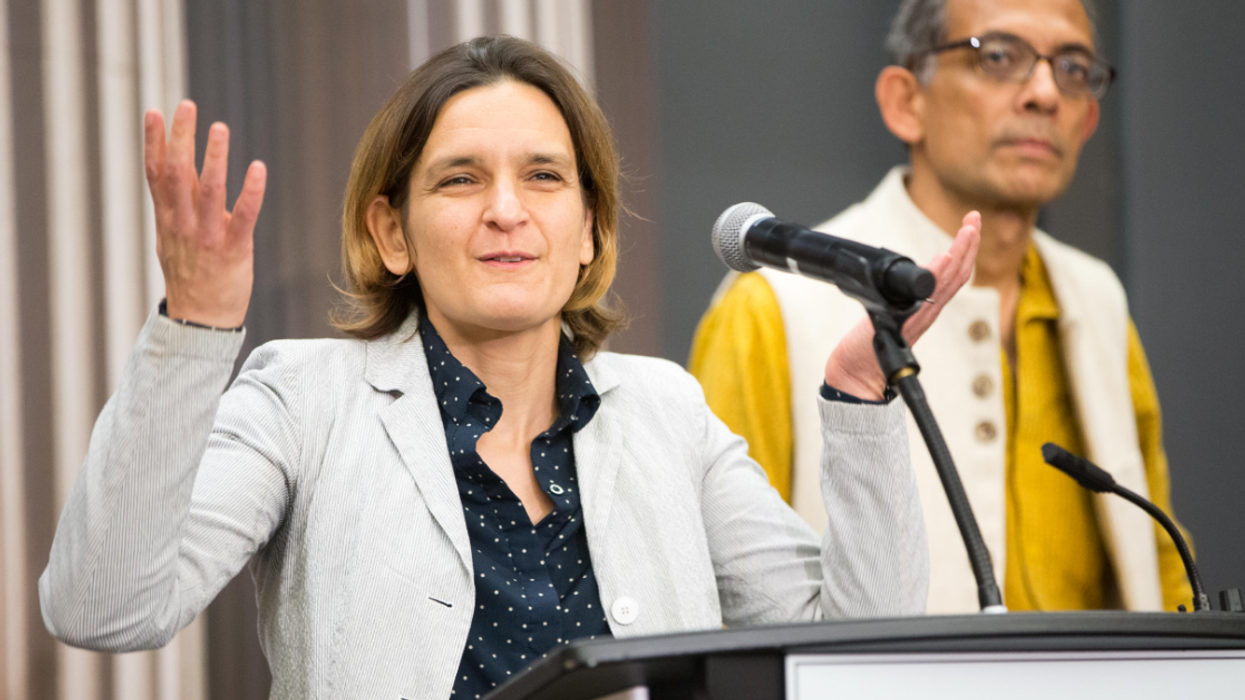French-American professor Esther Duflo recently became the second woman to ever receive the Nobel Prize for Economics, and its youngest ever recipient at just 46 years old.
This outstanding accomplishment was marred by news outlets referring to the researcher and MIT professor as simply the "wife" of fellow Nobel Laureate Abhijit Banerjee.
Headlines like:
- "Indian-American MIT Prof Abhijit Banerjee and wife wins Nobel in Economics" — The Economic Times
- "Indian-American Abhijit Banerjee, wife Esther Duflo and Michael Kremer win 2019 Nobel Economics Prize" — FirstPost
- "Indian-American MIT Prof Abhijit Banerjee and wife Esther Duflo win Noble prize in Economics" — Business Insider
Banerjee has certainly contributed much to their research, and is very deserving of the Nobel Prize, but his accomplishments do not overshadow Duflo's. The fact that they happen to be married doesn't make her contributions disappear either.
The pair were awarded the prize, along with fellow economist Michael Kraemer of Harvard University, for their experimental work in alleviating global poverty through changing the way we think about solutions.
An explanation of their methods is featured on NobelPrize.org.
"It involves dividing this issue into smaller, more manageable, questions – for example, the most effective interventions for improving educational outcomes or child health."
"They have shown that these smaller, more precise, questions are often best answered via carefully designed experiments among the people who are most affected."
"The Laureates' research findings – and those of the researchers following in their footsteps – have dramatically improved our ability to fight poverty in practice."
"As a direct result of one of their studies, more than five million Indian children have benefitted from effective programmes of remedial tutoring in schools."
"Another example is the heavy subsidies for preventive healthcare that have been introduced in many countries."
Duflo is the co-founder and co-director of the Abdul Latif Jameel Poverty Action Lab (J-PAL), headquartered at the Massachusetts Institute of Technology, where she also teaches poverty alleviation and development economics.
She has received numerous other academic honors, such as the Princess of Asturias Award for Social Sciences, in addition to being named one of Time Magazine's most influential people in the world in 2011.
Many on social media were incredulous that Esther had been described only as Banerjee's wife, considering her multitude of accomplishments.
Some argued that one headline highlighted Banerjee because it was an Indian paper and he is of Indian descent, but not everyone believed that.
If the Indian media wanted to highlight Banerjee in their headline it would have been simple to list the three recipients with Banerjee's name first, or even just say that Banerjee and two others were awarded the prize. There was no reason to specify that one of the recipients is his wife.
Women's accomplishments are still often downplayed, or completely attributed to male colleagues. An Associated Press headline from last year illustrated this well.
"Stephen King and his wife donate $1.25M to New England Historic Genealogical Society"
In a slightly irate Facebook post, King emphasized that the idea for the donation was actually Tabitha's.
"The gift was her original idea, and she has a name: TABITHA KING."
Tabitha is an accomplished author in her own right, and her name is right there in the name of their charitable foundation: The Stephen & Tabitha King Foundation.
Framing women's accomplishments this way when discussing them gives the unconscious implication that the women would not have been able to do things without their spouse. Men are not given this same treatment by the media.
People may not really believe this explicitly, but being exposed to an idea over and over again can make it very difficult to ignore.
Those who cover these stories have a responsibility to give credit where credit is due, and make sure that folks reading about an accomplishment know exactly who did the work to make it happen.
******
Have you listened to the first season of George Takei's podcast, 'Oh Myyy Pod!'?
In season one we explored the racially charged videos that have taken the internet by storm.
We're hard at work on season two so be sure to subscribe here so you don't miss it when it goes live.
Here's one of our favorite episodes from season one. Enjoy!








 Roberto Schmidt/AFP via Getty Images
Roberto Schmidt/AFP via Getty Images





 u/pizzaratsfriend/Reddit
u/pizzaratsfriend/Reddit u/Flat_Valuable650/Reddit
u/Flat_Valuable650/Reddit u/ReadyCauliflower8/Reddit
u/ReadyCauliflower8/Reddit u/RealBettyWhite69/Reddit
u/RealBettyWhite69/Reddit u/invisibleshadowalker/Reddit
u/invisibleshadowalker/Reddit u/Wishnik6502/Reddit
u/Wishnik6502/Reddit u/kateastrophic/Reddit
u/kateastrophic/Reddit u/blking/Reddit
u/blking/Reddit u/SlagQueen/Reddit
u/SlagQueen/Reddit u/geezeslice333/Reddit
u/geezeslice333/Reddit u/meertaoxo/Reddit
u/meertaoxo/Reddit u/crystal_clear24/Reddit
u/crystal_clear24/Reddit u/stinkpot_jamjar/Reddit
u/stinkpot_jamjar/Reddit
 u/Bulgingpants/Reddit
u/Bulgingpants/Reddit
 @hackedliving/TikTok
@hackedliving/TikTok @hackedliving/TikTok
@hackedliving/TikTok @hackedliving/TikTok
@hackedliving/TikTok @hackedliving/TikTok
@hackedliving/TikTok @hackedliving/TikTok
@hackedliving/TikTok @hackedliving/TikTok
@hackedliving/TikTok @hackedliving/TikTok
@hackedliving/TikTok @hackedliving/TikTok
@hackedliving/TikTok @hackedliving/TikTok
@hackedliving/TikTok @hackedliving/TikTok
@hackedliving/TikTok
 @vanderjames/Instagram
@vanderjames/Instagram @vanderjames/Instagram
@vanderjames/Instagram @vanderjames/Instagram
@vanderjames/Instagram @vanderjames/Instagram
@vanderjames/Instagram @vanderjames/Instagram
@vanderjames/Instagram @vanderjames/Instagram
@vanderjames/Instagram @vanderjames/Instagram
@vanderjames/Instagram @vanderjames/Instagram
@vanderjames/Instagram @vanderjames/Instagram
@vanderjames/Instagram @vanderjames/Instagram
@vanderjames/Instagram